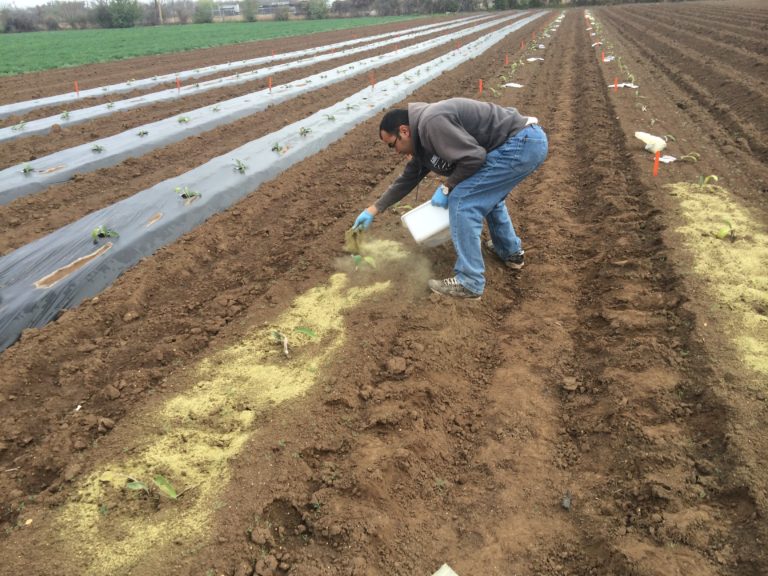A&M AgriLife expands research on artichokes as commercial crop for Texas.Recent studies focus on conventional, organic farming/soil amendments.
Dr. Yahia Othman inspects initial planting of artichoke varieties in an organic field at the Uvalde center. (Texas A&M AgriLife Research photo)
UVALDE – Researchers at the Texas A&M AgriLife Research and Extension Center in Uvalde have completed two more studies – both focusing on soil amendments and variety adaptation – related to the viability of organically-grown artichokes as a commercial crop in Texas.
Artichokes are a reasonably low-maintenance crop, requiring about the same growing season and less effort as onions, but with much higher profit potential.
Dr. Daniel Leskovar, center director and Texas A&M AgriLife Research vegetable physiologist leading artichoke research efforts, said the facility has been conducting a breadth of artichoke research since 2006.
Dr. Daniel Leskovar next to a lysimeter used in previous research to help determine soil moisture and evapotranspiration rates in artichoke varieties.
He said previous center research included most aspects of growing artichokes, from seed and transplant quality and other management practices aimed at increasing crop yield, head quality and nutritional aspects. Studies evaluated different varieties of artichoke in relation to different irrigation regimes and nitrogen fertilization rates, along with water-use efficiency, drought and heat tolerance.
“These studies and examples of successful artichoke production in South Texas, the Winter Garden area, near Dallas and elsewhere have demonstrated the potential for artichokes as an alternative crop,” he said. “So our most recent studies have been focused on the best methods for organic production, particularly the use of soil amendments to improve artichoke yield and quality on new hybrids producing green and red color heads.”
Leskovar said the first study, “Organic and conventional farming differentially influenced soil respiration, physiology, growth and head quality of artichoke cultivars,” looked at how farming and fertilization affected globe artichokes. This study was co-authored with Dr. Yahia Othman, a research associate with AgriLife Research and now an assistant professor at the University of Jordan.
The Green Globe Improved was one several globe varieties of artichoke studied in the most recent research.
The study, published in the Journal of Soil Science and Plant Nutrition, can be found at https://tinyurl.com/UvaldeArtichokeResearch.
The two-year study assessed how organic and conventional fertilizing systems affected growth, marketable yield, head quality and soil chemical properties of globe artichokes, including Deserto, Lulu, Romolo, Green Globe Improved and Imperial Star cultivars. Fertilizers were applied to both conventional and organic soil through drip irrigation system. In both years, significant differences were found across cultivars and soil type.
“The organic system increased the artichoke head quality indicators of chlorogenic acid by 31 percent and cynarin by 12 percent as compared to the conventional system,” Leskovar said. “And after two years of soil amendment, organic fertilizer improved soil respiration per carbon dioxide — a key soil health indicator — 20-fold as compared to conventional field chemical fertilizer.”
However, he also noted over the study period artichoke plants grown in conventional fields with conventional fertilization had better plant morphology, physiology and marketable yield than those grown in their organic field during both growing seasons.
“The results of this study suggest organic farming is probably the best system to improve soil and head quality of globe artichoke, but it may not be the best option for farmers when yield is the primary short-term target,” Leskovar said.
A second two-year study he and Othman completed, “Organic soil amendments influence on soil health, yield and phytochemicals of globe artichoke heads,” was published in Biological Agriculture and Horticulture.
The two most recent studies were related to organic farming and the use of plant- and animal-based organic fertilizers.
This study assessed the influence of plant- and animal-based soil amendments on different aspects of artichoke production quantity and quality. An abstract of that study and access to the full paper can be found at https://tinyurl.com/ArtichokeOrganicAmendments.
“The study investigated four certified organic fertilizers — fish meal, blood meal, alfalfa meal and chicken manure — as experimental treatments,” Leskovar said. “We assessed and compared the soil respiration and organic matter content of soil treated with the alfalfa meal, a plant-based fertilizer, versus the three animal-based fertilizers.”
After two years, soil amended with the alfalfa meal plant-based fertilizer had higher soil respiration and organic matter content than soil amended with the animal-based fertilizers. Additionally, concentrations of phytochemicals in artichoke heads grown in soil amended with alfalfa treatment were higher than in those grown with animal-based fertilizers
“The study also showed crop yield from soil treated with chicken manure was higher compared with the alfalfa treatment,” Leskovar noted. “And in the first year of the study, yields from both chicken manure and fish meal treatments were higher than the alfalfa treatment. However, the cost of the alfalfa meal fertilizer was higher than that of the animal-based fertilizers.”
He said taking all factors into account, while plant-based fertilizer can be an ideal option for improving soil and head quality of artichokes, from a financial standpoint, animal-based fertilizers may be an appropriate choice for organic farmers when yield and overall cost are the main concerns.
Leskovar will share the results of these and other studies from the Uvalde center at the X International Symposium on Artichoke, Cardoon and Their Wild Relatives to be presented by the International Society of Horticultural Science in Orihuela, Spain on March 12. He will be a keynote speaker at the symposium, presenting a scientific paper titled “Environment, water and nutrient management review: Analysis, approaches and trends.”
Source: Texas AgriLife Extension
Writer: Paul Schattenberg, 210-859-5752, paschattenberg@ag.tamu.edu
Contact: Dr. Daniel Leskovar, 830-278-9151, daniel.leskovar@ag.tamu.edu



























